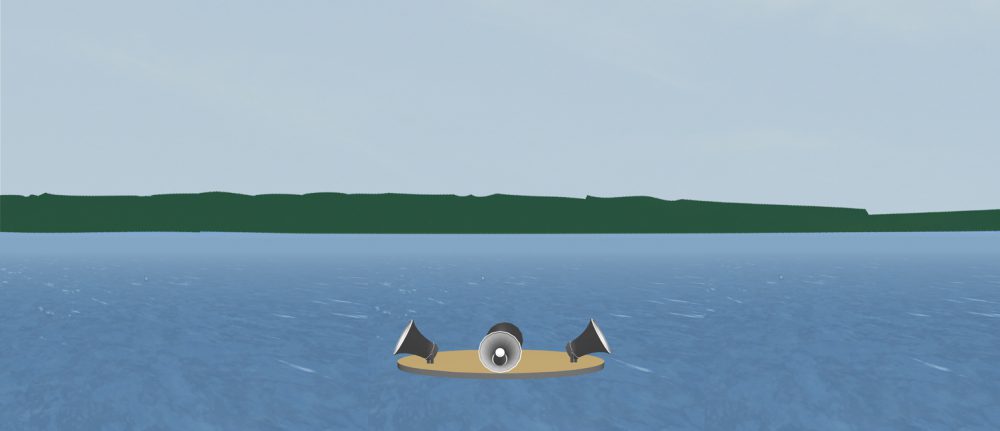Many Thousand Miles Behind Us Many Thousand Miles Before
Erin Colleen Johnson gives an exclusive preview of her upcoming sound installation at the Maine Maritime Museum.
A teaser trailer for Erin Colleen Johnson’s Many Thousand Miles Behind Us Many Thousand Miles Before, 2016, at the Maine Maritime Museum, Bath. Courtesy the artist.
Many Thousand Miles Behind Us Many Thousand Miles Before, which I will install on the waterfront of the Maine Maritime Museum this June, weaves together two songs about returning home after a long journey: “Rolling Home,” a 19th-century sea shanty, and the 1970s Lebanese hit song “Rajeen Ya Hawa.” According to Duncan Emrich’s American Sea Songs and Shanties, “Rolling Home” is a “sailors’ farewell to the foreign land they were leaving for the homeward voyage.” For this installation, it is sung by Alison Lee Freeman, a performer and voice teacher from Maine, who specializes in sea shanties. In the Lebanese musical Loulou, “Rajeen Ya Hawa” marks the moment when the main character arrives home after a long period away. First performed by Fairuz, one of the most widely known living singers in the Arab world, it is sung here by Salam Nassar, a student who sings in the Middle Eastern Ensemble at Bowdoin College, where I teach. Nassar is from Georgia; her parents moved there from Syria and Palestine. As the result of a collaborative decision with me, Nassar sings “Rajeen Ya Hawa” because of its ubiquity in Syrian culture and its lyrics about home, exile, and travel.
Sea shanties, sea songs, and ballads play an important role in Maine’s maritime history. These songs were primarily meant to accompany moments of work and leisure on board large merchant sailing vessels. While the lyrics and subjects of individual songs vary, most speak to the hope for smooth passages through treacherous waters and safe returns, and these songs were meant to forge a sense of togetherness and optimism among the crew.

A preliminary rendering of Erin Colleen Johnson’s Many Thousand Miles Behind Us Many Thousand Miles Before, 2016, at the Maine Maritime Museum in Bath, Maine. Courtesy the artist.
The role of such songs still resonates in contemporary maritime transits. A Haaretz article from last year by Syrian journalist Thaer al-Nashef chronicles his experience crossing the Mediterranean Ocean from Turkey to Greece with Syrian refugees. He states that while onboard, “almost unconsciously, everyone began singing Syrian folk songs together, helping to overcome the fear.” In 2015 alone, more than a million refugees and migrants from around the world undertook dangerous sea routes across the Mediterranean. The sea shanties create a connection to Maine’s past but rework them for present needs. In a state with a growing Arabic-speaking community, a governor who called for a ban of Syrian refugees, and the whitest population in the U.S., Many Thousand Miles asks the listener to consider these historically-rich shanties in the context of current conversations around immigration and diversity in Maine. It simultaneously allows us to consider how popular music travels, creates connections, and dissipates like an ocean fog.
Sea shanties are traditionally associated with masculine travel, labor, and the desire for a woman waiting at home. In Many Thousand Miles, two women sing both songs to emphasize the transformation of maritime travel into a place of loss and uprooting across gender, their voices creating a sonic collage. When writing about collage, Lucy Lippard draws on “the favorite feminist metaphor: the web, or network, or quilt as an image of connectiveness” and states that “the notion of connections is also a metaphor for the breakdown of race, class and gender barriers, because it moves out from its center in every direction.”
Four speakers on a floating platform—shown in the preliminary diagram above—will be installed in Maine’s Kennebec River, ten miles from where it empties into the ocean. The voices will sing toward and away from the shore—simultaneously arriving and embarking, calling and responding, harmonizing and discording. Wave height data will be culled from sensors in the river and put into a pseudorandom number generator. The generator will determine which speaker plays which track and when, creating a never-ending, yet never-identical composition (excerpted in the sound clip above). It unfolds with unpredictable potential, one that escapes my control as it becomes subject to the movement of the water.
Editor's Note
Many Thousand Miles Behind Us Many Thousand Miles Before is installed June 15 – August 25, 2016, at the Maine Maritime Museum (243 Washington Street) in Bath, Maine.



